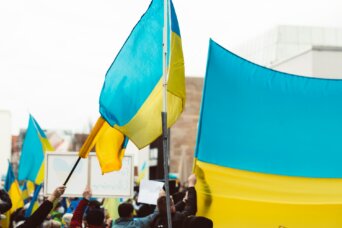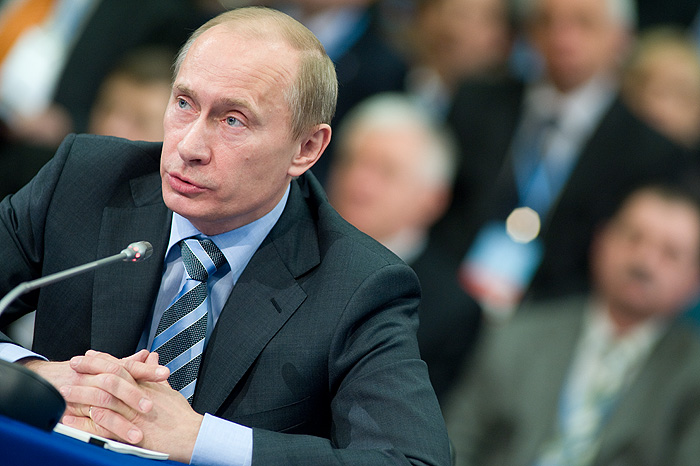- About
- Topics
- Story
- In-Depth
- Picks
- Opinion
- News
- Donate
- Signup for our newsletterOur Editors' Best Picks.Send
Read, Debate: Engage.
| topic: | Refugees and Asylum |
|---|---|
| located: | Ukraine, Russia |
| editor: | Abby Klinkenberg |
The world is watching as Vladimir Putin’s Russia continues to stage its relentless attack on Ukraine. After the continuous reassurance by regional experts, political scientists and Russia itself that war was all but out of the question, a full-scale invasion of Ukraine was launched on 24 February. Poli-sci game theory, economic calculus and humanitarian decency have let us down. War has broken out.
In the days that have unravelled since, shock and disbelief have dominated the global news cycle. For the people on the ground, however, the crisis has been ongoing - for eight years. Since Russia’s annexation of Crimea in 2014, a silent war largely neglected by mainstream media has been raging in the Donbas (the eastern Ukrainian oblasts of Donetsk and Luhansk). As the international community prepares for an impending refugee crisis, a look back on the humanitarian consequences of the past eight years in the Donbas gives an impression of the scale and scope of the damage already done - as well as a sense of what may be to come now that conflict has swallowed the entire country.
In the wake of Russia’s annexation of Crimea in 2014, the Ukrainian government has been embroiled in conflict with Russian-backed separatist movements in the Donbas. Since its beginning, the United Nations High Commissioner for Refugees (UNHCR) states that over 1.5 million Ukranians have been internally displaced, uprooted from their homes and livelihoods as a consequence of Russian aggression. According to the World Health Organisation, “The humanitarian crisis in Eastern Ukraine has affected 4.4 million people… of those affected, 3.4 million are currently in need of humanitarian assistance.” These figures are staggering in and of themselves - even more so considering that the conflict has affected around 10 percent of Ukraine’s total population of approximately 44 million. Older populations and those with disabilities are particularly vulnerable in this conflict, as 30 percent of those in need in the Donbas are elderly. Despite the urgent need for support, “the humanitarian response in Ukraine has historically been underfunded” - as of late February 2022, only 9 percent of the UN’s $190 million Humanitarian Response Plan had been funded.
Last October, seven years into the conflict, Alyona Budagovska, a communications manager at People in Need, an NGO present on the frontline, told FairPlanet that it “continues to be a forgotten crisis with little media coverage.” Naturally, the situation has changed - with the world now paying rapt attention, it remains to be seen how the international community will respond to Ukraine's ballooning humanitarian crisis.
While it is difficult to estimate the humanitarian consequences of this developing war, the United Nations estimates that 100,000 Ukrainians have already been displaced since the invasion began. Recent media coverage of miles-long traffic jams towards Ukraine’s neighbours to the west seem to corroborate the mass outflux. The United Nations predicts that the number of Ukrainian refugees seeking asylum abroad could swell to five million.
For the moment, though, only women and children are allowed to escape. Just before midnight on 24 February, Ukrainian President Volodymyr Zelenskyy announced that Ukrainian men between the ages of 18 and 60 would no longer be allowed to leave the country. This news, aimed to prevent a drain of able-bodied men from taking up arms and defending Ukraine from its Russian occupiers, certainly impacts the plans of millions of Ukrainian citizens seeking to flee the violence. The policy is set to remain in place “for the period of the legal regime of martial law.” The consequences of this pronouncement, in terms of both family separation and its impact on the number of refugees, are yet to be determined.
The United Nations expects Ukraine’s European neighbours to welcome most refugees, though international solidarity along this vein has also been expressed by the United States, Australia and Canada, among others. As TIME noted, “The governments of all five countries that share a border with Ukraine - Poland, Slovakia, Hungary, Romania and Moldova - which have historically opposed refugee resettlement, announced that they will receive Ukrainian refugees.” These countries, which have resisted taking in refugees from places like Afghanistan and Syria, are opening their doors to Ukrainians. Germany, building on its status as the EU country most receptive to refugees, has also expressed its willingness to do its part.
While showing solidarity in these terms, Western leaders are relying primarily on largely toothless sanctions to deter Russia’s offensive. Thus far, they have proven ineffective. Little has changed since their announcement, even as the most vicious sanctions on the table - to cut Russia off from SWIFT and to impose sanctions on Russia’s central bank - have been levied. As the war escalates and more people are displaced, traumatised and killed, the international community must do everything in its power to restore peace in Ukraine. Until then, the ongoing humanitarian crisis will only escalate.
Photo by Markus Spiske

